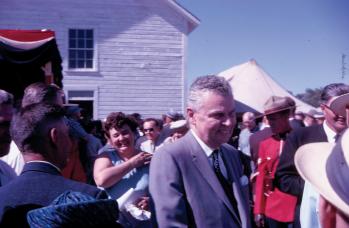
John Diefenbaker was born in Neustadt, Ontario, on September 18, 1895. He was the eldest of the two sons of William T. Diefenbaker and his wife Mary (née Bannerman). The family moved to the Fort Carlton district in 1903 because the doctors of the era recommended the dry prairie climate to help his father’s breathing problems. In 1905, the family moved to Hague, and in 1906 relocated to a homestead near Borden.
In 1910, the Diefenbaker family moved to Saskatoon so that John and his brother Elmer could attend high school. Diefenbaker graduated from what is now Nutana Collegiate in the spring of 1912, and entered the University of Saskatchewan as a member of the first class to be educated on the new campus. He studied economics and politics for his BA, and began graduate work on an MA. In 1916, he volunteered for service in World War I, and was granted his MA in absentia. He was sent to England for training, but was removed from service as an invalid and returned to Canada in 1917. He returned to the University of Saskatchewan to study law, graduating in 1918.
John Diefenbaker was called to the Saskatchewan Bar in 1919, and opened his own law office in Wakaw on July 1, 1919. He had always been interested in politics, and in 1920 won election as an alderman in Wakaw. In 1922, he won a decision protecting French language rights in Saskatchewan in the case of Boutin et al. vs. Mackie.
In 1924, Diefenbaker opened a new law office in Prince Albert, beginning his long association with that city. He ran as a Conservative in the federal elections of 1925 and 1926 and in the provincial election of 1929, but was defeated each time. On June 29, 1929, he married Edna Mae Brower, a school teacher who had grown up in Langham.
Diefenbaker ran for mayor of Prince Albert in 1933, but was defeated. He became leader of the provincial Conservative Party in 1936 and ran in the provincial election of 1938, but lost again. He considered abandoning politics, but was persuaded to run one last time in the federal election of 1940. He won the constituency of Arm River and was elected to every federal Parliament thereafter, although he did switch to the Prince Albert riding in 1953.
He ran for the Conservative Party leadership in 1942, but came third to John Bracken, who insisted that the party become the Progressive Conservatives. He again ran for leader in 1948, but lost to George Drew. He lost his wife Edna to leukemia in 1951.
John Diefenbaker married Olive Freeman Palmer on December 8, 1953. He won the leadership of the Progressive Conservatives in 1956. In 1957, he led his party to a surprising election victory, although it was a minority government.
In 1958, Parliament was dissolved and Diefenbaker led his party to the largest election victory in Canadian political history. His government lost its majority in the federal election of 1962, but continued as a minority government. In 1963, Lester Pearson led the Liberals to a minority government, and Diefenbaker became leader of the Opposition. He continued in that role until 1967 when he gave way to Robert Stanfield, who had been elected leader of the party the year before. Diefenbaker continued to serve as a member of Parliament until his death in 1979.
The governments led by John Diefenbaker are notable for a number of accomplishments. Diefenbaker was a champion of human rights, and his government passed Canada’s first Bill of Rights in 1958. He also appointed the first First Nations senator, James Gladstone of Alberta, and extended the right to vote to First Nations people. Diefenbaker criticized the Soviet Union for its repression of minorities. He headed the movement for racial equality in the Commonwealth, which led to South Africa leaving that organization.
Having grown up on a pioneer farm, Diefenbaker knew the difficulties faced by the agricultural industry. His government brought in an Agricultural Stabilization Act in 1958 which provided for flexible support and minimum prices on commodities. The Diefenbaker government also began wheat sales to China, which opened a huge new market for Canadian farmers. Diefenbaker supported the construction of the South Saskatchewan Dam at Outlook (later named the Gardiner Dam). The lake it created was named Lake Diefenbaker in his honour.
A controversial decision of the Diefenbaker government, which still resonates, was the cancellation of the Avro Arrow airplane. This jet had been developed to intercept Soviet bombers over the Arctic should North America ever be attacked. When the Russians launched Sputnik it was evident that they had missiles which could reach across the world, and the Arrow’s task was over before it really began. The Americans and British, who had similar aircraft under development, cancelled their programs in favour of missile systems. After failing to find other customers or uses for the airplane, the Diefenbaker government cancelled the Arrow in 1959.
The defence crisis created by the Soviet missile threat was a contributing factor to the end of the Diefenbaker government. The military insisted on a missile defence system, but the only one available was the already obsolete American Bomarc missile. It was designed to be equipped with a nuclear warhead, and this created a controversy in Canada, which had never had nuclear weapons. John Diefenbaker’s government divided on the issue, and he lost the confidence of Parliament. This defeat led to the election of 1963, won by the Pearson Liberals.
Diefenbaker lost his second wife Olive in 1976. He was re-elected to Parliament for a record thirteenth time in 1979. He passed away at his home in Ottawa on August 16, 1979. A state funeral was held in Ottawa, and his body was transported by train across the country, stopping many times for Canadians to pay their respects. He is buried, with Olive, beside the Diefenbaker Canada Centre on the campus of the University of Saskatchewan in Saskatoon.
R. Bruce Shepard